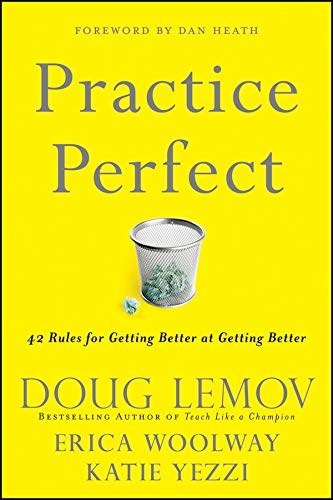Practice Perfect: 42 Rules for Getting Better at Getting Better / Doug Lemov, Erica Woolway, Katie Yezzi, Dan Heath,
| List Price: | |
Our Price: $21.74 | |
|
For Bulk orders
| |
|
Used Book Price: | |
| Practice Perfect: 42 Rules for Getting Better at Getting Better / Doug Lemov, Erica Woolway, Katie Yezzi, Dan Heath, | |
| Publisher: Jossey-Bass | |
| Availability: | |
| Sales Rank: 62885 | |
|
Similar Books
Amazon.com Exclusive: Q & A with Authors Doug Lemov, Erica Woolway, and Katie Yezzi



What would you say are the few biggest misconceptions around practice?
Though we’ve found there are actually more than a few misconceptions about practice, here are three:
- Myth 1: Practice to improve your weaknesses. Not true. You should in fact focus on practicing strengths. You’ll get stronger results this way.
- Myth 2: Stop practicing when you achieve competence. Nope. What marks champions is their excellence at something—they may have weaknesses, but their strengths are honed and polished to the level of brilliance. The value of practice begins at mastery!
- Myth 3: Practice is dull. Wrong. It certainly has a reputation for being a bleak necessity and the primary provenance of children laboring over trombones and basketballs. But in fact, practice is fun, exciting, and ideal for adults.
How do you suggest people incorporate the right kind of practice into their daily lives?
There are many ways. One concrete idea is to practice with a partner. Find a peer who cares as much as you do about some key aspect of your work and schedule ten (fun) minutes, three times a week, to work on the skills you’re both interested in developing.
What does each of you practice in your professional or personal lives?
Doug: I practice a lot with my kids. They’re athletes—soccer players and skiers, especially. It’s my goal to help them be good at something they care about. And though I played soccer in college, I think back with sadness at how much better I wanted to be and how much time I spent trying to get better on my own when, in retrospect, I was wasting my time. I learned how to handle the ball only long after college. And so, in addition to wanting to help my kids succeed at the things they love, I want to model for them how to get better at things throughout their lives, so they never have to feel that. One bright spot, one thing I think was very helpful to them as soccer players, is the two-footed drill. I started having them do it when they were younger to get them natural and fluid at two of the core building blocks of soccer—being able to use both feet and being in the habit of redirecting your first touch. In the two-footed drill, we pass the ball back and forth, but you have to receive the ball with one foot, transfer it to the other foot on the first touch, and pass it back with that foot—in one fluid motion. Always two feet; always two touches. And the focal point is the speed of the foot-to-foot process. Once my kids got it down, we just kept doing it, over and over. We do it every time we warm up, so they are fluid, natural, and automatic. It’s definitely made them much more fundamentally sound at the game. It’s also allowed them to allocate their brain power to thinking about what to do with the ball when they get it in the game, since they’re pretty automatic at receiving.
Erica: In my professional life, what I find myself practicing most are the presentations that I have to give in front of large audiences. In preparing for a presentation, after I have created and revised my materials, I carefully script my talking points. I then practice delivering the presentation quietly to myself; when I am ready, I ask a colleague to watch a small section and give feedback on any part that is new or particularly challenging for me. My final step the morning of the presentation is usually to practice in front of a full-length mirror. The first time I did this (after getting over feeling incredibly awkward) I learned so much about my non-verbal communication. I saw myself shifting my weight frequently from foot to foot, and I realized that signaled a lack of confidence to my audience. Every time I practice with a mirror, I learn something new about what I am signaling to my audience. In my personal life I practice with my kids, but not in the traditional sense of the word. My oldest son is only four, so he is still too young for the consistent practice of a particular sport or hobby, but he and his little brother are not too young to benefit from practice. For example I realized recently that our bedtime routine (from brushing our teeth to heads asleep on pillows) was taking entirely too long. So I planned how to streamline it, explained it to them step-by-step, and we practiced it a few times around 3pm on a Saturday afternoon. That first night, they were excited about the new “Bedtime Club,” and we followed all the steps to a tee–cutting bedtime in half. We then practiced it consistently for a week or so, and now everybody in our house feels a little less stress in the evenings.
Katie: I try to practice difficult conversations that I know I need to have with colleagues or the parents of the students in the school I lead. I usually practice with my managing director, and that almost always includes me taking notes as he models what that conversation might sound like. In particular, I write down key phrases in outline format to ensure I remember the key points and make them clearly. I run through what I want to say a couple times in that moment, and I usually do it again as I drive home. Then, I review my notes right before I have the conversation. Practice definitely helps me to stay calm and confident when emotions are high. In my personal life, I play and practice Ultimate Frisbee. I’ve played for over 20 years, but what I practice most are the basic skills of throwing and catching. I notice that it makes a huge difference in my pass completion during games if I have practiced completing passes before playing. That kind of practice makes me more focused and more confident.
Now you can buy Books online in USA,UK, India and more than 100 countries.
*Terms and Conditions apply
Disclaimer: All product data on this page belongs to
 .
.No guarantees are made as to accuracy of prices and information.










